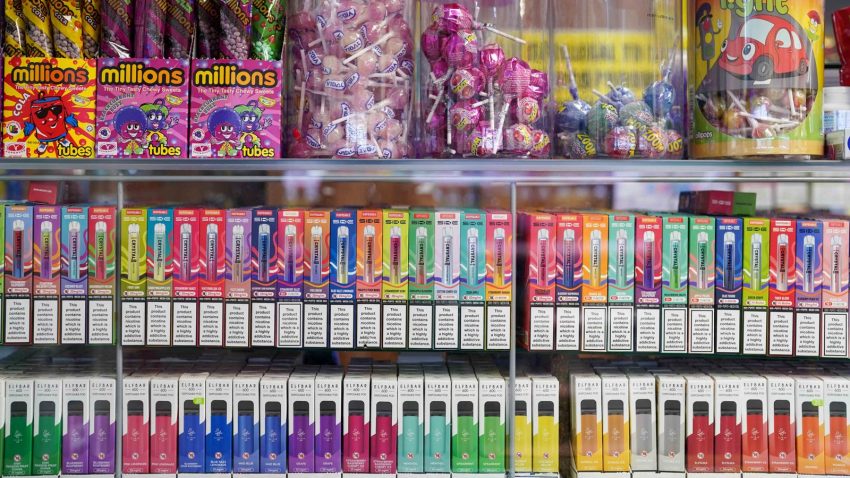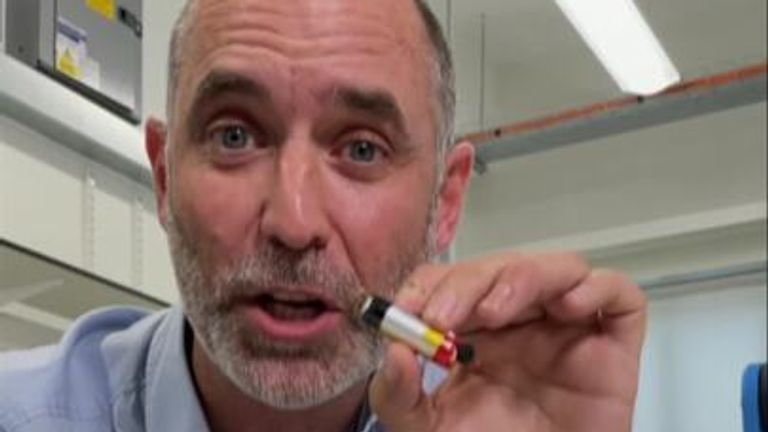Disposable vapes will be banned in the UK from 1 June.
The ban on selling or supplying disposable vapes, announced in January last year, applies both in shops and online.
Vapes have skyrocketed in popularity in recent years, with usage growing by more than 400% between 2012 and 2023, according to the government.
But why is the government cracking down on disposable ones, what are the punishments for continuing to sell them – and could there be wider vape bans in the future?
Why are disposable vapes being banned?
The UK-wide ban is designed to tackle waste and the impact of vapes on the environment.
It only applies to disposable vapes, also known as single-use vapes, while reusable vapes can still be sold.
Analysis by Material Focus released in December showed an estimated 8.2 million vapes were being thrown away or littered every week in the UK – the equivalent of 13 per second.
Disposable vapes are typically thrown away in general waste bins or littered rather than being recycled, according to the government.
Even when recycled, they usually need to be disassembled by hand, which is a slow and difficult process, it said.
The government, in its latest guidance on the ban, called them an “inefficient use of critical resources” that “causes harm to biodiversity”.
It said their lithium-ion batteries can also cause fires, adding the ban would stop plastic, lead, and mercury from “leaching into the environment, which can cause waterways to be contaminated and poison our wildlife”.
The government has also said it hopes the ban will make vaping less accessible to children, as statistics show a growing popularity among those aged 11 to 15.
NHS figures from last year showed nearly a quarter of children in that age bracket had tried vaping and nearly one in 10 did it frequently.
Read more: Why are vapes bad for the environment?
Will it be illegal to own a disposable vape?
No, having disposable vapes in your possession after 1 June is not illegal if you are not intending to sell or supply them.
Customers who still have disposable vapes after 1 June will still be able to return the vapes and vape parts to shops that have sold them, and those shops will have an obligation to dispose of them properly.
What if I still have a supply of disposable vapes after 1 June?
Any leftover disposable vapes after 1 June will have to be recycled.
The government says they should only be disposed of in vape bins and collected for recycling.
What is the punishment for continuing to sell and supply them?
A variety of government agencies, including the Border Force, can inspect shops for illegal vapes and report anyone breaking the rules.
Methods of punishment vary slightly depending on where in the UK you are found to be violating the rules.
Here’s a summary of how it will work in each country:
England and Wales
Civil sanctions can be applied in the first instance if you’re found selling or supplying vapes. These can include a stop notice, a compliance notice or a fine of £200.
If you continue to violate the rules, you can be charged with an unlimited fine, a prison sentence of up to two years, or both.
Scotland
If you are found violating the rules, you could be slapped with a fixed penalty notice of £200, which, if paid within 14 days, would be discounted to £150.
The fine rises by £200 every time you are caught.
If you do not accept the fixed penalty notice, or in instances where an enforcement officer does not consider a fine appropriate, the offender can be fined £5,000, sentenced to two years in prison, or both.
Northern Ireland
There will be no civil sanctions in Northern Ireland, and anyone breaking the rules could instead receive a fine of up to £5,000 on summary conviction in a magistrates’ court.
On further conviction, you could face a prison sentence of up to two years.
How to know the difference between a disposable and reusable vape
A reusable vape must be rechargeable and refillable, meaning it has to have a battery and needs to have either a removable and replaceable coil or a chamber, pod or tank that can be refilled with e-liquid.
To be considered reusable, replacement components like pre-filled pods, e-liquid refill bottles and coils must be separately available to buy either in-store or online.
You can check whether specific products are reusable by checking the Medicines and Healthcare Products Regulatory Agency’s notified products list.
If you search for a product and it doesn’t appear, it means it is not legal to sell or supply, as all legal nicotine-containing vapes are listed.
From 1 June, any single-use ones will be removed.
Has the ban changed much so far?
It was Rishi Sunak’s Conservative government that originally proposed the ban before it was adopted by Sir Keir Starmer’s Labour Party.
While the ban is only coming in now, a study by University College London (UCL) looked at the impact after it was announced in January 2024.
Researchers found the proportion of people vaping increased by nearly a quarter each year from January 2022 to January 2024, but stayed constant between January 2024 and January this year, including for young people.
They also said they saw a steep decline in disposable vape use after January 2024, particularly among 16- to 24-year-olds, whose use of disposables almost halved from 63% to 35%.
While it’s a positive development for the environment, lead author Dr Sarah Jackson said results suggested the ban “may have limited impact on vaping rates in general” and said it was “likely that people using these products will move to reusable versions rather than stop vaping completely”.
Vaping has been marketed as a way for cigarette smokers to quit and is generally considered to be healthier because you inhale nicotine in a vapour rather than smoke. Also vapes do not produce tar or carbon monoxide – two of the most damaging elements in tobacco smoke.
But the long-term effects of vaping on people’s health is not fully understood.
The government has backed a 10-year study to track 100,000 young people and collect health data, which is expected to provide the most detailed information yet on the impacts of vaping.
While there is no further ban on vapes in the works, the government’s Tobacco and Vapes Bill, which is currently in the committee stage at the House of Lords, includes powers to potentially restrict the packaging, marketing and flavours of e-cigarettes.



